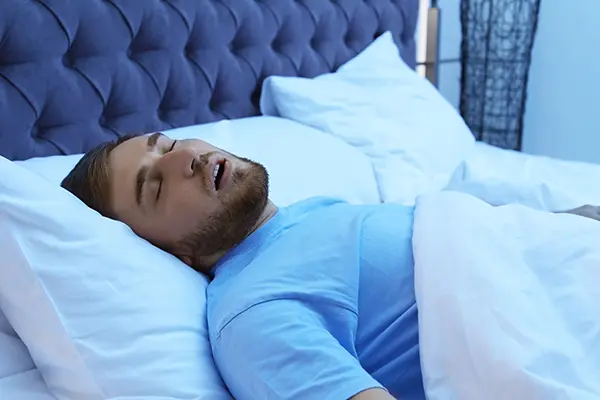Sleep Apnea
Dentist McHenry, IL
 Sleep apnea is a disorder in which the patient periodically stops breathing while they sleep. This only lasts for a few seconds at a time, but it can be detrimental to your health. Sleep apnea is associated with various other disorders, such as hypertension, diabetes, heart disease, chronic fatigue, stroke, and various mental health disorders. At McHenry Smile Center, we can provide sleep apnea treatment and counsel you on home remedies. Sleep apnea is a disorder in which the patient periodically stops breathing while they sleep. This only lasts for a few seconds at a time, but it can be detrimental to your health. Sleep apnea is associated with various other disorders, such as hypertension, diabetes, heart disease, chronic fatigue, stroke, and various mental health disorders. At McHenry Smile Center, we can provide sleep apnea treatment and counsel you on home remedies.
Symptoms
Patients do not always know that they have sleep apnea, since the most common symptom is snoring. This is something that you would need to inform someone about if you notice they snore excessively throughout the night. In addition, gasping and choking sounds would also indicate the presence of sleep apnea. Other symptoms you or the patient may notice include daytime fatigue, dry mouth upon waking, headaches, restlessness throughout the night, feeling short of breath in the night, and frequent bathroom use throughout the night.
Types of Sleep Apnea
There are three types of sleep apnea disorder. Obstructive sleep apnea (OSA) is the type that most sleep apnea patients experience. This is sleep apnea caused by throat muscles relaxing too much, causing the airway to close. Central sleep apnea (CSA) is a neurological disorder in which the brain fails to send the correct signals to maintain your breathing while you sleep. Complex sleep apnea can be difficult to diagnose as it is actually a combination of the two.
Sleep Apnea Treatment
There are several devices we can recommend for sleep apnea patients, though the most common is a CPAP (continuous positive airway pressure) machine or a nightguard. CPAP machines keep the airway open by controlling the flow of pressure. Nightguards keep the airway open by moving the jaw forward so that, even if the muscles do relax, the structures do not close the airway. Other machines include EPAP’s (expiratory positive airway pressure), BiPAP’s/BPAP’s (bilevel positive airway pressure), and adaptive servo-ventilation (ASV). These all use pressure to maintain airflow.
For more serious cases, surgery may be needed. However, this is generally only sought if other treatments have failed. We can perform surgery to restructure the area and open the airway. We can also provide sleep apnea implants, which provide stimulation to keep the muscles from relaxing too much.
Sleep apnea can also be remedied by lifestyle changes for patients in some cases. For example, weight and tobacco use are risk factors for this disorder. Excess weight decreases the size of your airway, so a good diet and exercise regime could resolve your breathing issues. You should stop using tobacco products (chewing and smoking) as these can weaken the muscles in the throat and damage the internal structure. Alcohol and certain medications can also contribute to sleep apnea, though you would need to discuss this further with the medical professional prescribing the medication. You can also try avoiding heavy meals and caffeine two hours before you go to bed. Some patients find use in over-the-counter nasal strips and sleeping on their side as well. For additional information on sleep apnea treatment, call (815) 578-1000 now. |